初二(八年级)下册英语第一单元知识点归纳
最全面人教版八年级下册英语第一单元知识点归纳总结

Unit 1 What's the matter?一、词汇与短语◆重点单词A部分1.matter n. 问题;事情2.sore adj. 疼痛的;酸痛的3.stomachache n. 胃痛;腹痛4.foot n. 脚;足5.neck n. 颈;脖子6.stomach n. 胃;腹部7.throat n. 咽喉;喉咙8.hurt v. (使)疼痛;受伤9.fever n. 发烧10.passenger n. 乘客;旅客11.lie v. 躺;平躺12.break n. 间歇;休息13.rest v. &n. 放松;休息14.onto prep. 向;朝15.X-ray n. X射线;X光16.trouble n. 问题;苦恼17.toothache n. 牙痛18.hit n. (用手或器具)击;打19.headache n. 头痛20.herself pron. (she的反身代词)她自己21.off adv. & prep. 离开(某处);不工作;从……去掉B部分1.bandage n. 绷带v. 用绷带包扎2.press v. 压;挤;按3.sick adj. 生病的;有病的4.knee n. 膝;膝盖5.breathe v. 呼吸6.knife n. 刀7.sunburned adj. 晒伤的8.blood n. 血9.ourselves pron. (we反身代词)我们自己10.mean v. 意思是;打算11.climber n. 登山者;攀登者12.importance n. 重要性;重要13.risk n.&v. 危险;风险;冒险14.decision n. 决定;抉择15.accident n.(交通)事故;意外遭遇16.control v.&n. 限制;约束;管理17.situation n. 情况;状况18.spirit n. 勇气;意志19.kilo( = kilogram) n. 千克;公斤20.death n. 死;死亡21.rock n. 岩石22.nurse n. 护士◆重点短语A部分1.have a cold 感冒2.lie down 躺下3.have a stomachache 胃痛4.take one's temperature 量体温5.have a fever 发烧6.to one's surprise 使……惊讶的是7.get off 下车8.right away 立即;马上9.take breaks (take a break) 休息10.talk too much 说得太多11.drink enough water 喝足够的水12.have a very sore throat 嗓子非常疼13.get an X-ray 拍X光片14.see a dentist 看牙医15.drink some hot tea with honey 喝一些加蜂蜜的热茶16.put some medicine on sth.在……上面敷一些药17.feel very hot 感到很热18.sound like 听起来像19.all weekend 整个周末20.in the same way 以同样的方式21.go to a doctor 看医生22.go along 沿着……走23.on the side of the road 在马路边24.shout for help 大声呼救25.without thinking twice 没有多想26.have a heart problem 有心脏病27.thanks to 多亏了;由于28.in time 及时29.save a life 挽救生命30.get into trouble 陷入麻烦31.hurt oneself 受伤32.fall down落下;摔倒B部分1.be used to 习惯于……;适应于……2.in a difficult situation 在困境中3.take risks (take a risk) 冒险4.keep on doing sth. 继续(或坚持)做某事5.run out (of) 用尽;耗尽6.make a decision 作出决定7.cut off 切除8.get hit on the head 撞到头部9.get out of 离开;从……岀来10.be interested in 对……感兴趣11.give up 放弃12.mean doing sth. 意味着做某事13.put a bandage on sth. 用绷带包扎…14.lose one's life 失去生命15.feel sick 感到恶心16.mountain climbing 登山运动17.have problems breathing 呼吸困难18.be in control of 掌管;管理◆重点句子A部分1.What's the matter with you?=What's the trouble with you?=What's wrong with you?你怎么了?2.What should she do? 她该怎么办呢?3.Did you fall down? 你跌倒了吗?4.Should I take my temperature? 我应该量一下体温吗?5.I think I sat in the same way for too long without moving.我想我以同样的姿势一动不动地坐得太久了。
最新人教版八年级英语下册第一单元知识点汇总

最新人教版八年级英语下册第一单元知识点汇总Unit 1 What’s the matter?一、基础知识1.我感冒了。
可以表达为I had a cold、catch a cold或have the flu。
have a fever表示发烧,have a cough表示咳嗽,have a stomachache或肚子疼表示胃疼,have a toothache表示牙疼,have a headache表示头疼。
2.将身体部位和ache(疼痛)结合起来构成新的复合词,如stomach+ache=stomachache,head+ache=headache,tooth+ache=toothache,back+ache=backache,表示相应的疼痛。
3.“怎么啦?出什么事情了?”可以表达为What’ s the matter。
也可以用What’ s the trouble with you?或What’ s wrong with you。
matter和trouble为名词,其前可加the或形容词性物主代词,而wrong是形容词不能加the。
用于询问某人有什么病或遇到什么麻烦、问题,其后跟询问对象时,与介词with连用,如What’s the matter with sb。
= What’s your trouble?= What’s up?= What happens to sb。
举例来说,当问到“What’s the matter with you?”时,回答可以是“I have a bad cold.”4.maybe表示“或许”,常用于句首,表示可能性,后加句子。
例如Maybe you are right。
may be是情态动词+be的结构,意为“可能,也许”,后加名词、代词或形容词。
例如He maybe angry。
sound like可以和名词、代词以及从句结合使用,如It sounds like you don’t know the truth.It sounds like a good idea。
八下英语语法归纳

八下英语语法归纳Prepared on 21 November 2021新版八年级英语下册第一单元知识点归纳Unit 1 What’s the matter一、基础知识1. What’ s the matter 怎么啦出什么事情了【解析】matter/ ' mt(r)) /n.问题;事情What’ s the matter with you= What’s the trouble with you = What’ s wrong with you 你怎么了【注】: matter 和trouble 为名词,其前可加the 或形容词性物主代词,wrong 是adj. 不能加the【用法】用于询问某人有什么病或某人遇到什么麻烦、问题其后跟询问对象时,与介词with连用。
即:What’s the matter with sb. = What’s your trouble = What’s up = What happens to sb.—What’s the matter with you —I have a bad cold.2. I had a cold.我感冒了。
have a cold=catch a cold=have theflu感冒have a fever 发烧 have a cough咳嗽 have a stomachache胃疼,肚子疼 have a toothache牙疼 have a headache头疼3. 身体部位+ache(疼痛)构成新的复合词stomach+ache=stomachache head+ache=headachetooth+ache=toothache back+ache=backache后背痛4. much too+ 形容词,意为太...... ,too much+名词,意为很多,大量。
5. enough【形容、副词】足够的/地,enough放在名前后,形副后。
八下英语unit1知识点总结

八下Unit1知识点总结一、Comic strip∽Reading 考点:★★★重点短语:搬走move away 等候… wait for… 出生be born 打牌play cards 从那时起since then 发生take place 结婚get married 下象棋play Chinese chess一个钢铁厂a steel factory在这几年间over the years非常了解某物know sth very well惊人的变化the amazing changes把某物变成某物turn sth into sth把某物放进某物里put sth into sth意识到这个问题realize the problem像以前一样经常as often as before采取行动去改善这种情况take action to improve the situation★★★重要用法:1、曾经做某事used to do sth.被用来做某事be used to do sth.习惯于做某事be/get used to doing sth.2、....得多much+比较级3、与某人分享某物share sth with sb4、对某人友好be kind/nice/friendly to sb5、采取行动做某事take action to do sth6、做某事是怎样的I t’s + 形容词+ to do sth7、a bit + 形容词感觉有点孤独feel a bit lonely8、lonely 孤独的,寂寞的,偏僻的alone 单独,独自9、“乘坐某种交通工具” :by + 交通工具(放句末)take + a/the + 交通工具(放句中)骑自行车:by bike=ride a bike步行去学校:walk to school=go to school on foot步行回家:walk home=go home on foot【注意:( home , here , there ) 这3个地点副词前,不加to 】10、花费时间做某事take+时间+to do sth;spend+时间+doing sth= spend+时间+on sth 11、in some ways 在某种程度上;在某些方面in this way 用这种方法in one’s way 挡某人的路on one’s way to…在某人去…的路上by the way 顺便说一下;顺便问一下二、Grammar 语法考点:【现在完成时态】1、概念:①:过去开始发生的动作或存在的状况一直延续到现在例句:They have waited for more than two hours.他们等了两个多小时。
八年级下英语第一单元知识点总结
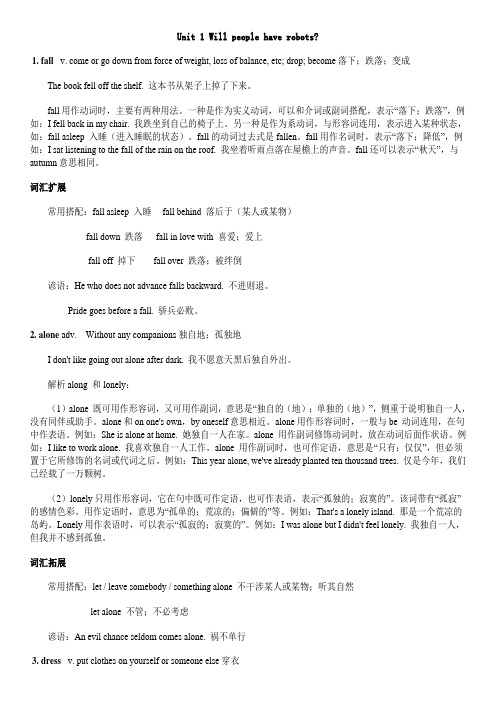
Unit 1 Will people have robots?1. fall v. come or go down from force of weight, loss of balance, etc; drop; become 落下;跌落;变成The book fell off the shelf. 这本书从架子上掉了下来。
fall用作动词时,主要有两种用法。
一种是作为实义动词,可以和介词或副词搭配,表示“落下;跌落”,例如:I fell back in my chair. 我跌坐到自己的椅子上。
另一种是作为系动词,与形容词连用,表示进入某种状态,如:fall asleep 入睡(进入睡眠的状态)。
fall的动词过去式是fallen。
fall用作名词时,表示“落下;降低”,例如:I sat listening to the fall of the rain on the roof. 我坐着听雨点落在屋檐上的声音。
fall还可以表示“秋天”,与autumn意思相同。
词汇扩展常用搭配:fall asleep 入睡fall behind 落后于(某人或某物)fall down 跌落fall in love with 喜爱;爱上fall off 掉下fall over 跌落;被绊倒谚语:He who does not advance falls backward. 不进则退。
Pride goes before a fall. 骄兵必败。
2. alone adv. Without any companions 独自地;孤独地I don't like going out alone after dark. 我不愿意天黑后独自外出。
解析along 和lonely:(1)alone 既可用作形容词,又可用作副词,意思是“独自的(地);单独的(地)”,侧重于说明独自一人,没有同伴或助手。
alone和on one's own,by oneself意思相近。
期末Units1-10单元知识点总结 人教版八年级英语下册
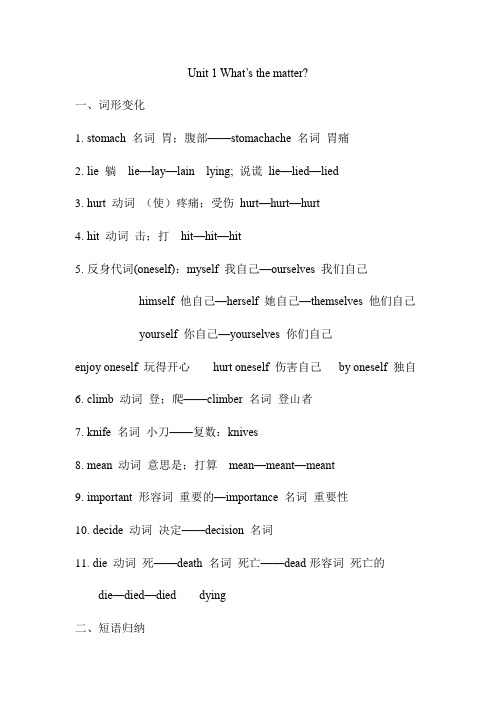
Unit 1 What’s the matter?一、词形变化1.stomach 名词胃;腹部——stomachache 名词胃痛2.lie 躺lie—lay—lain lying; 说谎lie—lied—lied3.hurt 动词(使)疼痛;受伤hurt—hurt—hurt4.hit 动词击;打hit—hit—hit5.反身代词(oneself):myself 我自己—ourselves 我们自己himself 他自己—herself 她自己—themselves 他们自己yourself 你自己—yourselves 你们自己enjoy oneself 玩得开心hurt oneself 伤害自己by oneself 独自6.climb 动词登;爬——climber 名词登山者7.knife 名词小刀——复数:knives8.mean 动词意思是;打算mean—meant—meant9.important 形容词重要的—importance 名词重要性10.decide 动词决定——decision 名词11.die 动词死——death 名词死亡——dead形容词死亡的die—died—died dying二、短语归纳1.lie down 躺下to one’s (my/his/her...) surprise 令某人惊讶的是2.take one’s (my/your/his/her..) temperature 量体温3.take a break = take breaks 休息take a risk = take risks冒险4.run out 物做主语:The money ran out. 钱用光了。
run out of 人做主语:I ran out of money. 我用光了钱。
5.make a decision = make decisions 做决定6.be in control of 掌管He is in control of the company. 他掌管公司。
英语八年级下册第一单元笔记

英语八年级下册第一单元笔记一、重点单词。
1. matter.- n. 问题;事情。
例如:What's the matter?(怎么了?)- v. 重要;要紧。
例如:It doesn't matter.(没关系。
)2. stomachache.- n. 胃痛;腹痛。
这是一个合成词,由“stomach(胃)+ache(疼痛)”构成。
3. foot.- n. 脚;足。
复数形式是“feet”。
例如:I hurt my feet.(我伤到我的脚了。
)4. neck.- n. 颈;脖子。
5. fever.- n. 发烧。
例如:He has a high fever.(他发高烧了。
)6. lie.- v. (lay - lain)躺;平躺。
例如:You should lie down and rest.(你应该躺下休息。
)- v. 说谎。
过去式是“lied”,过去分词是“lied”。
例如:He lied to me.(他对我撒谎了。
)7. rest.- v. & n. 放松;休息。
例如:Let's have a rest.(让我们休息一下吧。
)8. cough.- v. & n. 咳嗽。
例如:He coughs a lot.(他咳嗽得很厉害。
)9. X - ray.- n. X射线;X光。
10. toothache.- n. 牙痛。
也是合成词,“tooth(牙齿)+ache(疼痛)”。
二、重点短语。
1. have a cold.- 感冒。
例如:I have a cold. I feel terrible.(我感冒了。
我感觉很糟糕。
)2. have a stomachache.- 胃痛;肚子疼。
3. lie down.- 躺下。
4. take one's temperature.- 量体温。
例如:You should take your temperature first.(你应该先量一下体温。
初二英语下册知识点归纳
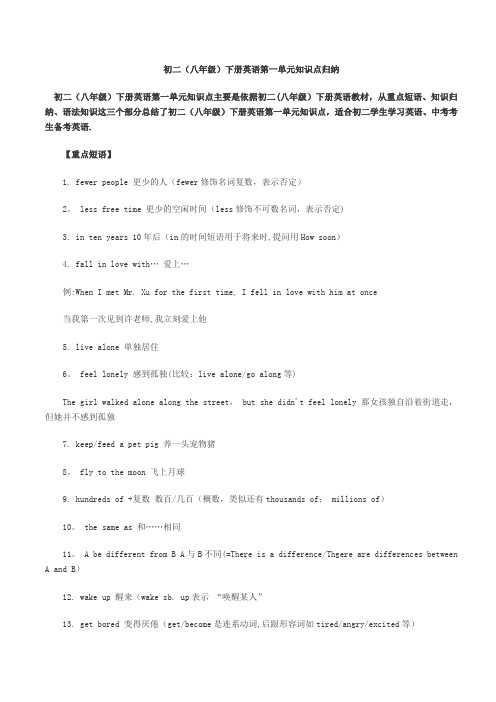
初二(八年级)下册英语第一单元知识点归纳初二(八年级)下册英语第一单元知识点主要是依据初二(八年级)下册英语教材,从重点短语、知识归纳、语法知识这三个部分总结了初二(八年级)下册英语第一单元知识点,适合初二学生学习英语、中考考生备考英语.【重点短语】1. fewer people 更少的人(fewer修饰名词复数,表示否定)2。
less free time 更少的空闲时间(less修饰不可数名词,表示否定)3. in ten years 10年后(in的时间短语用于将来时,提问用How soon)4. fall in love with…爱上…例:When I met Mr. Xu for the first time, I fell in love with him at once当我第一次见到许老师,我立刻爱上他5. live alone 单独居住6。
feel lonely 感到孤独(比较:live alone/go along等)The girl walked alone along the street, but she didn't feel lonely那女孩独自沿着街道走,但她并不感到孤独7. keep/feed a pet pig 养一头宠物猪8。
fly to the moon 飞上月球9. hundreds of +复数数百/几百(概数,类似还有thousands of; millions of)10。
the same as 和……相同11。
A be different from B A与B不同(=There is a difference/Thgere are differences between A and B)12. wake up 醒来(wake sb. up表示“唤醒某人”13. get bored 变得厌倦(get/become是连系动词,后跟形容词如tired/angry/excited等)14. go skating 去滑冰(类似还有go hiking/fishing /skating/bike riding等)15. lots of/a lot of 许多(修饰可数名词、不可数名词都可以)16。
八年级英语下册第一单元知识点汇总

Unit 1 What’s the matter?词句精讲精练词汇精讲1. have a coldhave a cold是动词短语,意为“患感冒,伤风”,也可以说成catch a cold/get a cold或take a cold。
其中have表示“患病,得病”,不能用于进行时态,但可与一段时间连用,表示状态;而catch/geta cold则表示瞬时动作,不能同一段时间连用。
例如:I have had a cold for three days. 我感冒三天了。
此句也可以表达为:I had/caught/got a cold three days ago.【拓展】表示人体某部位“痛”时的几种结构:(1)have a + 身体部位名词后加-ache构成。
例如:have a headache 头痛have a toothache 牙痛have a stomachache胃痛(2)have a sore + 身体部位名词。
例如:have a sore throat 喉咙痛have a sore arm 胳膊痛have a sore foot 脚痛(3)身体部位+ hurt/ache。
例如:My eyes hurt. 我眼睛痛。
My legs ache. 我腿疼。
(4)have a pain in/ on + the + 身体部位。
例如:I have a pain in the arm. 我胳膊痛。
(5)There is something wrong with + one’s + 身体部位。
例如:There is something wrong with your eyes. 你的眼睛有毛病。
2. rest(1)rest作及物动词,意为“使休息”,作不及物动词,意为“休息”。
例如:You should rest your eyes after a lot of reading.在大量阅读之后,你应该休息一下你的眼睛。
八年级下册英语笔记重点归纳

八年级下册英语笔记重点归纳一、Unit 1 What's the matter?1. 重点单词。
- matter n.问题;事情。
常用搭配:What's the matter (with sb.)?(某人)怎么了?- have a cold 感冒。
类似的表达还有:have a fever(发烧),have a cough (咳嗽)等。
- stomachache n.胃痛;腹痛。
“-ache”为后缀,表示疼痛,如:headache (头痛),toothache(牙痛)。
- foot n.脚,复数形式为feet。
- lie v.躺;平躺。
lie - lay - lain。
例如:You should lie down and rest.(你应该躺下休息。
)- rest v. n.放松;休息。
如:take a rest(休息一下)。
2. 重点短语。
- take one's temperature 量体温。
例如:The nurse took my temperature.(护士给我量了体温。
)- take breaks (take a break) 休息。
We should take breaks when we are tired.(当我们累的时候应该休息。
)- get off 下车。
He got off the bus at the next stop.(他在下一站下了公共汽车。
)- to one's surprise 使……惊讶的是;出乎……的意料。
To my surprise, he passed the exam.(令我惊讶的是,他通过了考试。
)- What should I do? 我应该做什么?用于询问建议。
- You should see a dentist and get an X - ray. 你应该去看牙医并且拍个X 光片。
should为情态动词,后接动词原形,表示建议。
人教版八年级下册英语——知识点语法归纳总结
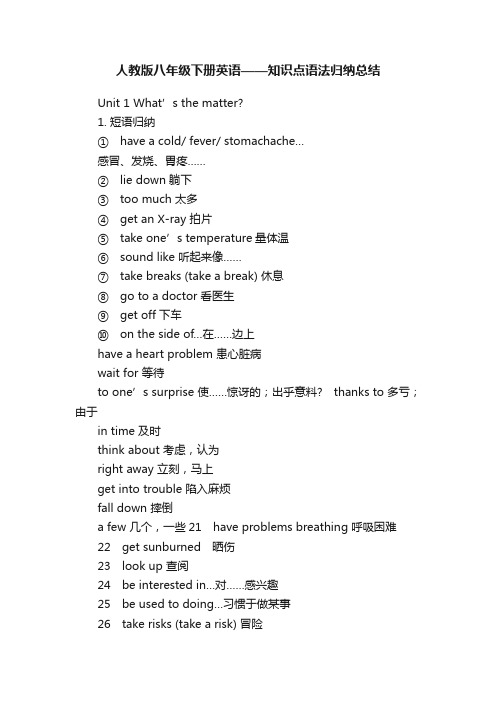
人教版八年级下册英语——知识点语法归纳总结Unit 1 What’s the matter?1. 短语归纳①have a cold/ fever/ stomachache…感冒、发烧、胃疼……②lie down 躺下③too much 太多④get an X-ray 拍片⑤take one’s temperature量体温⑥sound like 听起来像……⑦take breaks (take a break) 休息⑧go to a doctor 看医生⑨get off 下车⑩on the side of…在……边上have a heart problem 患心脏病wait for 等待to one’s surprise 使……惊讶的;出乎意料? thanks to 多亏;由于in time 及时think about 考虑,认为right away 立刻,马上get into trouble 陷入麻烦fall down 摔倒a few 几个,一些21 have problems breathing 呼吸困难22 get sunburned 晒伤23 look up 查阅24 be interested in…对……感兴趣25 be used to doing…习惯于做某事26 take risks (take a risk) 冒险27 lose one’s life 丧生28 became of 因为29 run out (of) 用尽,耗尽30 be ready to do sth. 准备做某事31 cut off 切除32 climb down 爬下33 get out of 离开;从……出来34 tell of 讲述35 the importance of (doing sth.) (做某事的)重要性36 be in control of 掌管,管理37 make a decision 做决定38 keep on doing sth. 坚持做某事39 give up 放弃40 cut/ hurt oneself 使自己受伤2. 典句必背①What’s the matter?②I have a stomachache.③What should I do?④Should I take my temperature?⑤I think you should lie down and rest.⑥If your head and neck still hurt tomorrow, then go to a doctor.⑦His love for mountain climbing is so great that he kept on climbing mountains even after this experience.3. 用法集萃(1) 当别人心情不好,身体不适或遇到麻烦时,我们可以用如下表达表示关心:What’s the matter?What’s the matter with you?What’s wrong with …?What’s the trouble\problem with …?(2) 英语中常用have描述身体的不适,此时have意为“患有”,常用结构:①have a + 疾病例:have a cold 感冒;have a fever 发烧;have a cough 咳嗽②have a + 身体部位-ache例:have a headache 头痛;have a toothache 牙痛③have a sore + 身体部位例:have a sore throat 咽喉痛;have a sore back 背痛(3) lie down躺下;tell lies/a lie 说谎含义过去式过去分词躺;平躺lay lain位于撒谎;说谎lied lied(4) maybe & may be①maybe,“或许”,常用于句首,表示可能性,后加句子。
英语八年级下册m1知识点

英语八年级下册m1知识点英语八年级下册M1是说英语八年级下册的第一模块,这个模块主要是讲述了一些重要的知识点,在这里我们来一一了解一下。
一、动词时态动词时态是英语语言中非常重要的一部分,我们必须掌握好它。
动词时态包括:现在时、过去时和将来时。
现在时表示现在正在发生的事情,过去时表示已经发生了的事情,将来时表示将要发生的事情。
二、被动语态被动语态是一个非常常用的语法形式,它用于表示动作的承受者。
例如:这本书被我借走了。
在这个句子中,“这本书”是承受者,“我”是动作的执行者。
三、宾语从句宾语从句是一个包含在宾语中的子句,它常常作为主句的宾语。
例如:我知道他在做什么。
在这个句子中,“他在做什么”是宾语从句。
四、状语从句状语从句是一个包含在句子中的子句,它通常用来修饰句子中的动词,形容词或者副词。
例如:当我见到他时,他正在做功课。
在这个句子中,“当我见到他时”是状语从句。
五、比较级和最高级比较级和最高级是英语中用来比较两个或多个事物差异的基本形式。
比较级表示两个事物之间的大小或者差异,最高级用来表示三个或多个事物之间的大小或者差异。
六、情态动词情态动词是一组特殊的助动词,它们与其它动词搭配使用,用来表达肯定、否定、建议、请求、可能性、能力等。
例如:我可以帮助你。
在这个句子中,“可以”就是一个情态动词。
以上就是英语八年级下册M1的知识点总结。
我们如果掌握了这些语法规则,就能更好地学习英语,更好地理解和应用英语。
人教版新版八年级英语下册Unit1 知识要点
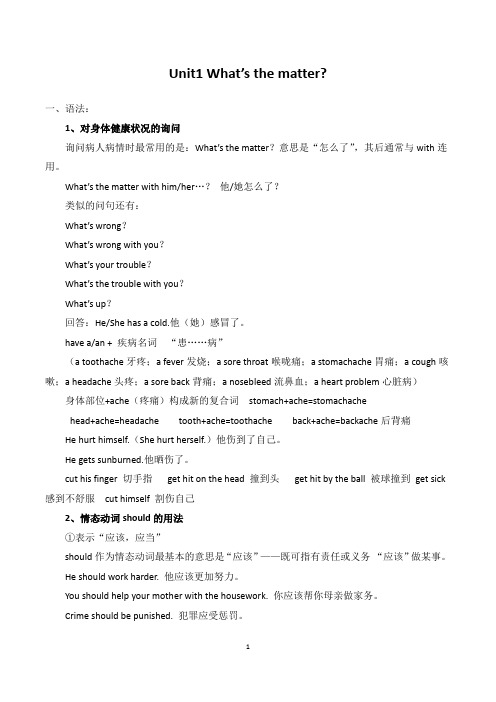
Unit1 What’s the matter?一、语法:1、对身体健康状况的询问询问病人病情时最常用的是:What’s the matter?意思是“怎么了”,其后通常与with连用。
What’s the matter with him/her…?他/她怎么了?类似的问句还有:What’s wrong?What’s wrong with you?What’s your trouble?What’s the trouble with you?What’s up?回答:He/She has a cold.他(她)感冒了。
have a/an + 疾病名词“患……病”(a toothache牙疼;a fever发烧;a sore throat喉咙痛;a stomachache胃痛;a cough咳嗽;a headache头疼;a sore back背痛;a nosebleed流鼻血;a heart problem心脏病)身体部位+ache(疼痛)构成新的复合词stomach+ache=stomachachehead+ache=headache tooth+ache=toothache back+ache=backache后背痛He hurt himself.(She hurt herself.)他伤到了自己。
He gets sunburned.他晒伤了。
cut his finger 切手指get hit on the head 撞到头get hit by the ball 被球撞到get sick 感到不舒服cut himself 割伤自己2、情态动词should的用法①表示“应该,应当”should作为情态动词最基本的意思是“应该”——既可指有责任或义务“应该”做某事。
He should work harder. 他应该更加努力。
You should help your mother with the housework. 你应该帮你母亲做家务。
(完整版)Unit1人教版八年级英语下册语法与知识点,推荐文档

Unit 1第一部分:Grammar一、情态动词(Modal Verbs)情态动词should 意为“应该,应当”,必须和后面的动词原形一起构成谓语,没有人称和数的变化。
用以表达职责和义务、提出劝告,而且表述的是自己的主观看法。
注意:should 在以why,who,how 等疑问词开头的问句中,意为“竟然,居然,怎么会”,表示意外、惊喜或在说话人看来是不可思议的。
三、反身代词表示反射或强调的代词叫做反身代词。
反身代词是由第一人称、第二人称形容词性物主代词或第三人称代词的宾格形式,词尾加self 或selves 组成。
反身代词可译“本人”、“本身”,为加强语气,也常翻译为“亲自”、“自己”。
不定人称代词one ---- o neself.第二部分:单词用法Section A1.What’s the matter?怎么了?该句常用询问某人患了何种疾病或遇到了什么麻烦,其后用with 引出对象。
1). What’s the matter with sb.?=what’s wrong with sb.?=what’s the trouble/problem with sb.?=what’s one’s trouble/problem?e.g. What’s the matter w ith Tom?=what’s with Tom?=What’s the with Tom?=What’s Tom’s?2). matter, 名词,“问题,事情”e.g. We have important (matter) to discuss.我们有些重要的问题要讨论。
3). 动词,“要紧,关系重大”e.g. It dosen’t that you came late.2.I have a cold. 我感冒了。
1).have/get/catch a cold “感冒,着凉”The old man a cold yesterday.那位老人昨天感冒了。
八年级英语下册知识点

八年级英语下册知识点Unit 1 what’s the matter?一、重点短语词组1. have a fever 发烧2. have a cough 咳嗽3. have a toothache 牙疼4. talk too much 说得太多5. drink enough water 喝足够的水6. have a cold 受凉;感冒7. have a stomachache 胃疼8. have a sore back 背疼9. have a sore throat 喉咙痛10. lie down and rest 躺下来休息11. hot tea with honey 加蜂蜜的热茶12. see a dentist 看牙医13. get an X-ray 拍X 光片14. take one’s temperature 量体温15. balanced diet平衡饮食16. go along…沿着……走17. take breaks 休息18. sound like 听起来像19. all weekend 整个周末20. in the same way 以同样的方式21. on the side of the road 在马路边22. shout for help 大声呼救23. without thinking twice 没有多想24. get off 下车get on 上车25. have a heart problem 有心脏病26. to one’s surprise 使.......惊讶的27. thanks to 多亏了;由于28. in time 及时29. save a life 挽救生命30. get into trouble 造成麻烦31. agree to do sth. 同意做什么32. because of 由于33. get out of 离开;从……出去34. hurt oneself 受伤35. put a bandage on sth.用绷带包扎36. fall down 摔倒37. feel sick 感到恶心38. have a nosebleed 流鼻血39. cut his knee 割伤他的膝盖40. put her head down 把她的头低下41. have problems breathing 呼吸困难42. mountain climbing 登山运动43. be used to doing sth. 习惯做某事44. take risks 冒险45. so that 为了46. So… that 如此……以至于…47. be in control of 掌管;管理48. in a difficult situation 在困境中49. keep on doing sth. 继续或坚持做某事 50. make a decision 做出决定51. stay healthy 保持健康=keep healthy=keep in good health=keep fit52. put some medicine on sth. 在…上面敷药二、重点句型1. What’s the matter?你怎么了?= What’s the trouble / problem with you?= What’s wrong with you?2. What should she do? 她该怎么办呢?Should I take my temperature? 我应该量一下体温吗?主语+ should/shouldn’t + 动词原形...①You should lie down and rest. 你应该躺下休息一会儿。
(完整版)人教版八年级英语下册Unit1知识点讲解(可编辑修改word版)

Unit 1 重点知识讲解Grammar一、情态动词(Modal Verbs)情态动词should 意为“应该,应当”,必须和后面的动词原形一起构成谓语,没有人称和数的变化。
用以表达职责和义务、提出劝告,而且表述的是自己的主观看法。
1.should 的句式结构2.s hould 的用法喜或在说话人看来是不可思议的。
二、其他表示建议的句型表示反射或强调的代词叫做反身代词。
反身代词是由第一人称、第二人称形容词性物主代词或第三人称代词的宾格形式,词尾加self 或selves 组成。
反身代词可译“本人”、“本身”,为加强语气,也常翻译为“亲自”、“自己”。
不定人称代词one ---- oneself.1、反身代词的分类2、反身代词的用法单词的用法Section A1.What’s the matter?怎么了?该句常用询问某人患了何种疾病或遇到了什么麻烦,其后用with 引出对象。
1). What’s the matter with sb.?=what’s wrong with sb.?=what’s the trouble/problem with sb.?=what’s one’s trouble/problem?e.g. What’s the matter with Tom?=what’s with Tom?=What’s the with Tom?=What’s Tom’s?2). matter, 名词,“问题,事情”e.g. We have important (matter) to discuss.我们有些重要的问题要讨论。
3). 动词,“要紧,关系重大”e.g. It dosen’t that you came late.2.I have a cold.我感冒了。
1).have/get/catch a cold “感冒,着凉”The old man a cold yesterday.那位老人昨天感冒了。
八年级英语下册第一单元知识点写总结

八年级下册英语知识点总结第一单元知识点总结一语法点(一)一般将来时1定义表示将来某个时间要发生的动作或存在的状态,也表示将来经常或反复的动作,常与将来时间连用如tomorrow,next week,等连用。
2构成肯定句主语+ will/shall/be going to +动词原形否定句在will/shall/be 后面直接加not一般疑问句讲will/shall/be提到句首Eg:(1)They will have a test tomorrow .(2)They will not have a test tomorrow.(3)Will they have a test tomorrow?3 注意 will , shall, be going to 的区别shall用于第一人称,Will用于各种人称(包括第一、第二、第三人称)will+动词原形“表示单纯意义将来要...”没有计划性be going to +动词原形“表示将要发生...”有计划、打算将要4 there be 句型的一般将来时肯定句 there will be+主语+其他否定句 there will not be+主语+其他一般疑问句 will there be+主语+其他肯定回答Yes,there will 否定回答No,there won’tEg :(1)There will be a nice basketball match tonight.(2)There won’t be a nice basketball match tonight.(3)Will there be a nice basketball match tonight?Yes,there will No,there won’t二知识点归纳1 be able to +动词原形能够做....2 make friends with sb. 与某人交朋友make sb.do sth. 让某人做某事..... let sb.do sth.3 try to do sth. 尽力做某事try doing sth. 尝试做某事4 It is +形容词+for sb.+to do sth.做某事对某人来说..5 help sb. With sth. 帮助某人做某事....help sb. do sth.6 There is/are +sb.+doing sth.有正在做...的...7 seem to do sth. 似乎/好像做某事...It seems that...似乎....seem like....好像/似乎....8 such +a/an 形容词+可数名词单数such +形容词+可数名词复数/不可数名词so +副词形/容词so +形容词+a/an 可数名词单数so +many/much/few/little+名词9 dress sb. 给某人穿衣服dress oneself 给自己穿衣服10 alone 与lonelyalone 单独指客观环境的孤独lonely 孤独的指心灵上的孤独11 live to be +基数词+year(s) old 活到....岁12 in + 一段时间“在...之后”(用于将来时,对其提问用how soon )13 fewer/more +可数名词复数更少/更多...fewer是few的比较级,more是many和much的比较级less/more +不可数名词更少/更多....less是little 的比较级14 注意: I think/suppose/believe等后的宾语从句如果是否定句,要将否定转移到主句上,叫做否定转移。
人教版八年级英语下册1-5单元知识点归纳
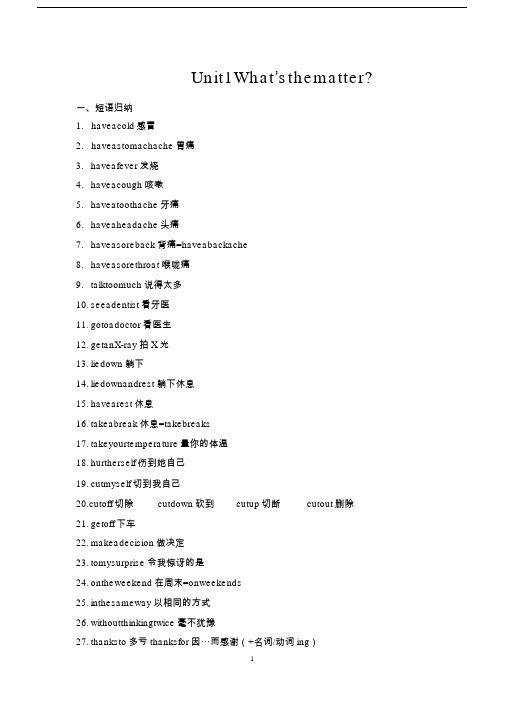
Unit1What’sthematter?一、短语归纳1.haveacold感冒2.haveastomachache胃痛3.haveafever发烧4.haveacough咳嗽5.haveatoothache牙痛6.haveaheadache头痛7.haveasoreback背痛=haveabackache8.haveasorethroat喉咙痛9.talktoomuch说得太多10.seeadentist看牙医11.gotoadoctor看医生12.getanX-ray拍X光13.liedown躺下14.liedownandrest躺下休息15.havearest休息16.takeabreak休息=takebreaks17.takeyourtemperature量你的体温18.hurtherself伤到她自己19.cutmyself切到我自己20.cutoff切除cutdown砍到cutup切断cutout删除21.getoff下车22.makeadecision做决定23.tomysurprise令我惊讶的是24.ontheweekend在周末=onweekends25.inthesameway以相同的方式26.withoutthinkingtwice毫不犹豫27.thanksto多亏thanksfor因⋯而感谢(+名词/动词ing)28.intime及时ontime按时29.savealife挽救生命30.getintotrouble陷入麻烦31.rightaway马上32.falldown跌倒33.waitfor等待34.beinterestedindoingsth.对做某事感兴趣35.giveup放弃二、用法集萃1.询问有什么病或有什么麻烦:What’sthematter(withsb.)?2.疾病的表达:have/hasa+疾病名称3.太多:toomuch+不可数名词;toomany+可数名词复数形式太:muchtoo+形容词4. enough足够的:①形容词+enough②enough+名词③itisenough+todosth.5. lie躺下过去式:lay现在分词:lying6.seesb.doingsth.看见某人正在做某事(正在进行)seesb.dosth.看见某人做了某事(看见动作的全过程)7.expecttodosth.期望做某事8.needtodosth.需要做某事9.helpsb.(to)dosth.帮助某人做某事10.tellsb.(not)todosth.告诉某人(不要)做某事11.asksb.todosth.要求某人做某事12.wanttodosth.想要做某事13.agreetodosth同.意做某事disagreetodosth.不同意做某事agreewithsb.同意某人的意见14.trouble问题;麻烦havetrouble/problemdoingsth.做某事有困难15.介词+doing常见的介词有:at;for;with;without;inabout16.be/getusedtodoingsth.习惯于做某事17.keepondoingsth.继续做某事18.minddoingtsh.介意做某事19.反身代词:myself我自己yourself你自己himself他自己herself她自己itself它自己复数:ourselves我们自己yourselves你们自己themselves他们自己20.knife-knives刀名词复数规则变化:①一般情况+s②以e结尾+s③以s、x、ch、sh结尾+es④以辅音字母+y结尾,变y为i+es⑤以o结尾,有生命+es;无生命+s⑥以f/fe结尾,变f/fe为v+es不规则变化:foot-feet脚、足tooth-teeth牙齿man-men男人woman-women女人mouse-mice老鼠21.important重要的importance重要性different不同的difference差异性22.death死亡(名词)die死(动词)dead死的(形容词)三、书面表达Howtokeephealthy如何保持健康Healthisimportant.Everyonewantstobehealthy.Letmetellyouhowtokeephealthy.Firstofall,weshouldeathealthyfood.Weshouldeatmorevegetablesandfruit.Wealson eedtodrinkmilk.Secondly,weshouldexercisealot.Weshoulddosomesportsafterschool.Finally,weshouldhaveenoughsleep.Tohaveagoodrest,weshouldgotobedearlyandgetupearly.Ithinkitisimportantforustokeephealthy.3Unit2I’llhelptocleanupthecityparks.一、短语归纳1. cleanup打扫干净cheerup使兴起来代词放中间2.giveout分发3.handout分发eupwith想出;提出(idea、plan等)5. putoff推迟puton穿衣服putup张贴putaway把⋯收好6.callup打电话;征召edtodosth.曾经做某事beusedtodingsth习.惯于做某事8. lonely孤独的(常用于feel之后)alone独自一人9.carefor照顾=takecareof10.afeelingofsatisfaction一种满足感11.tryout参加⋯选拔12.raisemoney募捐13.fixup修理14.giveaway赠送(money、oldclothes/books等)giveup放弃15.takeafter(外貌或行为)像16.besimilarto与⋯相似17.setup建立18.makeadifference影响;有作用19.disabledpeople残疾人20.makeaplan制定计划21.oldpeople’shome养老院22.helpoutwithsth.帮助解决困难23.abooklover书迷24.attheageof在⋯岁时etrue实现(与dream连用)26.atthesametime同时27.homelesspeople无家可归的人28.beworriedabout为⋯而担心worryabout担心29.forexample例如30.runoutof用完31.not⋯anymore不再32.atonce立刻;马上=rightaway二、用法集萃1.volunteertodosth自愿做某事2. difficult困难的difficulty困难havedifficulty(in)doingsth.做某事有困难3.excited兴奋的(人作主语)exciting使人兴奋的(物作主语)口诀:人+ed物+ing4.疑问词(how,what,where)+todo5. decidetodosth.决定做某事名词形式:decision makeadecision做决定6.learntodosth.学习做某事7.agoodwaytodosth.做某事的好方法8.wouldliketodosth.=wanttodosth.想要做某事9.thankyouforsth./doingsth.因某事/做某事而感谢10.kind善良的kindness善意Unit3Couldyoupleasecleanyourroom?一、短语归纳1.dothedishes清洗餐具2.takeouttherubbish倒垃圾3.foldtheclothes叠衣服foldmy/your/hisclothes4.sweepthefloor扫地5.makethebed铺床makemy/your/hisbed6.cleanthelivingroom打扫客厅7.helpoutwithsth.帮助解决某事8.atleast至少eover过来;顺便来访10.infrontof在⋯前面11.takethedogforawalk遛狗12.allthetime一直13.assoonas一⋯就⋯14.insurprise惊讶地15.hangout闲逛16.dochores做家务17.awasteoftime浪费时间18.inorderto为了19.getgoodgrades取得好成绩20.dependon依靠21.takecareof=carefor=lookafter照顾22.asaresult结果23.fallill生病二、用法集萃1.finishdoingsth.完成做某事2.if如果(主将从现,if后为从句,用一般现在时);是否(位于动词之后)3.assoonas一⋯就⋯.主将从现,assoonas后为从句4.replyangrily生气地回答(副词修饰动词,一般位于动词之后)abeautifuldog一只漂亮的狗(形容词修饰,名词,位于名词前)口诀:形名动副5.beangrywithsb.生某人的气6.as+形容词原级+as和⋯一样7.neitherdidI我也没有neither+be动词/助动词(do/does/did)/情态动词+主语“主语也不⋯..”so+be动词/助动词(do/does/did)/情态动词+主语“主语也⋯”8.can-could可以can,could还可以表示请求,could比can更有礼貌肯定回答:Sure./Ofcourse./Noproblem./Yes,sure.否定回答:No,youcan’t./Sorry,Ican’t.9.asksb.todosth.要求某人做某事10.borrow⋯from⋯跟⋯借(借进来)lend⋯to⋯把⋯借给⋯.(借出去)11.invitesb.todosth.邀请某人做某事12.helpwithsth.helpsb.(to)dotsh.帮助做某事13.havetimetodosth.有时间做某事havenotimetodosth没.时间做某事14.letsb.dosth.让某人做某事15.makesb.dosth.让某人做某事16.spend花费人+spend+时间+onsth/doingsth在某事上花时间/花时间做某事cost花费物+cost+金钱$某物花了多少钱take(took)花费Ittakes/tooksb.+时间+todo.做某事花了某人多少时间payfor付费17.itis+adj(forsb.)+todosth.做某事对某人而言是⋯的18.fair公平的unfair不公平的fairness公平性19.doone’spartindoingsth.尽自己的职责做某事20.the+比较级,the+比较级越...越⋯比较级and比较级越⋯越⋯theearlier⋯thebetter越早越好betterandbetter越来越好Unit4Whydon’tyoutalktoyourparents?一、短语归纳1.talkto/withsb.与某人交谈talkaboutsth.谈论某事2.freetime空闲时间3.allowab.todosth.允许某人做某事allowdoingsth.允许做某事4.hangout闲逛5.getintoafight争吵;打架6.sothat为了;以便于7.lookthrough浏览;快速查看8.workout成功地发展;解决9.getonwith/getalongwith和睦相处municatewithsb.与某人交谈11.abigdeal重要的事petewithsb.与某人竞争13.examskills应试技巧14.cutout删除pare⋯with⋯比较16.not..until直到⋯才17.arguewithsb.与某人争吵18.noproblem没问题19.not..anymore不再20.inmyopinion依我看21.thanksfor因⋯而感谢22.allkindsof各种各样的23.worryabout为⋯而担心=beworriedabout二、用法集萃1.提建议句型:①Youshould/shouldn’t dosth.②How/Whataboutdoingsth.?③Whydon’tyoudosth.?④Whynotdosth.?⑤Shallwedosth.?⑥Let’sdosth.⑦You’dbetterdosth.⑧Wouldyouminddoingsth.?常见回答:Goodidea./Soundsinteresting./I’dliketo./Great.否定:I’dloveto,butIhaveto⋯/Sorry,Ican’t.2.beangrywithsb.生某人的气3. although/though虽然不与but连用4.advice建议(不可数名词)5.refusetodosth.拒绝做某事6.instead代替;反而(位于句首或句尾)insteadof代替(位于句中)7.offertohelp提供帮助8.minddoingsth.介意做某事9.continuetodo/doingath.继续做某事10.keepondoingsth.继续做某事11.afew一些(肯定)few一点点(否定)修饰可数名词复数形式alittle一些(肯定)little一点点(否定)修饰不可数名词做题步骤:先看横线后的名词,判断可数还是不可数;其次,理解句子表达的肯定还是否定12.it’s timeforsth.该做某事了=it’stimetodosth.pete竞争(动词)competition竞争(名词)14.havetimetodosth有.时间做某事Unit5Whatwereyoudoingwhentherainstormcame?一、短语归纳1.gooff闹钟发出响声2.rainheavily下大雨3.pickup接电话;采摘4.atfirst起先5.fallasleep进入梦乡6.diedown逐渐变弱7.havealook看一看8.makeone’sway费力地前进9.insilence沉默10.takedown拆除;往下拽;记录11.atthetimeof⋯当⋯.的时候12.waitfor等待13.atthattime在那时(一般过去时标志词)14.wakeup醒来15.goshopping去购物16.takeashower洗澡17.inamess乱七八糟18.forexample例如19.makesure确保二、用法集萃1.过去进行时定义:表示在过去某一时刻或某一时间段正在进行的动作。
8下英语第一单元英语知识点
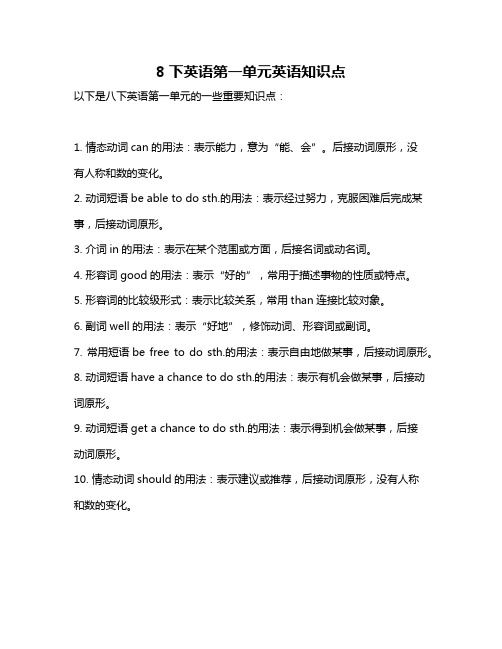
8下英语第一单元英语知识点
以下是八下英语第一单元的一些重要知识点:
1. 情态动词can的用法:表示能力,意为“能、会”。
后接动词原形,没
有人称和数的变化。
2. 动词短语be able to do sth.的用法:表示经过努力,克服困难后完成某事,后接动词原形。
3. 介词in的用法:表示在某个范围或方面,后接名词或动名词。
4. 形容词good的用法:表示“好的”,常用于描述事物的性质或特点。
5. 形容词的比较级形式:表示比较关系,常用than连接比较对象。
6. 副词well的用法:表示“好地”,修饰动词、形容词或副词。
7. 常用短语be free to do sth.的用法:表示自由地做某事,后接动词原形。
8. 动词短语have a chance to do sth.的用法:表示有机会做某事,后接动词原形。
9. 动词短语get a chance to do sth.的用法:表示得到机会做某事,后接
动词原形。
10. 情态动词should的用法:表示建议或推荐,后接动词原形,没有人称
和数的变化。
以上是八下英语第一单元的一些重要知识点,通过熟练掌握这些知识点,有助于提高英语语言能力。
- 1、下载文档前请自行甄别文档内容的完整性,平台不提供额外的编辑、内容补充、找答案等附加服务。
- 2、"仅部分预览"的文档,不可在线预览部分如存在完整性等问题,可反馈申请退款(可完整预览的文档不适用该条件!)。
- 3、如文档侵犯您的权益,请联系客服反馈,我们会尽快为您处理(人工客服工作时间:9:00-18:30)。
初二(八年级)下册英语第一单元知识点归纳初二(八年级)下册英语第一单元知识点主要是依据初二(八年级)下册英语教材,从重点短语、知识归纳、语法知识这三个部分总结了初二(八年级)下册英语第一单元知识点,适合初二学生学习英语、中考考生备考英语。
【重点短语】1. fewer people 更少的人(fewer修饰名词复数,表示否定)2. less free time 更少的空闲时间(less修饰不可数名词,表示否定)3. in ten years 10年后(in的时间短语用于将来时,提问用How soon)4. fall in love with…爱上…例:When I met Mr. Xu for the first time, I fell in love with him at once当我第一次见到许老师,我立刻爱上他5. live alone 单独居住6. feel lonely 感到孤独(比较:live alone/go along等)The girl walked alone along the street, but she didn’t feel lonely那女孩独自沿着街道走,但她并不感到孤独7. keep/feed a pet pig 养一头宠物猪8. fly to the moon 飞上月球9. hundreds of +复数数百/几百(概数,类似还有thousands of; millions of)10. the same as 和……相同11. A be different from B A与B不同(=There is a difference/Thgere are differences between A and B)12. wake up 醒来(wake sb. up表示“唤醒某人”13. get bored 变得厌倦(get/become是连系动词,后跟形容词如tired/angry/excited等)14. go skating 去滑冰(类似还有go hiking/fishing /skating/bike riding等)15. lots of/a lot of 许多(修饰可数名词、不可数名词都可以)16. at the weekends 在周末17. study at home on computers 在家通过电脑学习18. agree with sb. 同意某人(的意见)19. I don’t agree. = I disagree. 我不同意20. on a piece of paper 在一张纸上(注意paper/information/news/work/homework/housework等常考到的不可数名词)21. on vacation 度假22. help sb with sth/help sb do sth 帮助某人做某事23. many different kinds of goldfish 许多不同种金鱼24. live in an apartment 住在公寓里/live on the twelfth floor 住在12楼25. live at NO.332,Shanghai Street 住在上海路332号26. as a reporter 作为一名记者27. look smart 显得精神/看起来聪明28. Are you kidding? 你在骗我吗29. in the future 在将来/在未来30. no more=not …anymore 不再(强调多次发生的动作不再发生)I’ll go there no more.31. no longer=not…any longer 不再(强调状态不再发生)32. besides(除…之外还,包括)与except …but(除…之外,不包括)33. be able to与can 能、会l (be able to用于各种时态,而can只能用于一般现在时态和一般过去时态中;have to用于各种时态,而must 只能用于一般现在时态)例如:1.I have been able to/will be able to speak two languages. (不可以用can)2. had to stay at home/ will have to (不可以用must)34.be big and crowded 大而且拥挤34. be in college 在上大学35. live on a space station 住在空间站36. dress casually 穿得很随意casual clothing 休闲服饰37. win the next World Cup 赢得世界杯win award 获僵38. come true 变成现实39. take hundreds of years 花几百年的时间40. be fun to watch 看起来有趣41. over and over again 一次又一次42. be in different shapes 形状不同43. twenty years from now 今后20年【本单元目标句型】1. What do you think life will be like in 1000 years?2. There will be fewer trees、more buildings and less pollution in the future.l fewer; less表示否定之意,分别修饰可数名词和不可数名词;more二者都可以修饰。
3. Will kids go to school? No, they won’t/Yes, they will。
4. Predicting the future can be difficult.5. I need to look smart for my job interview.6. I will be able to dress more casually.7. I think I’ll go to Hong Kong on vacation, and one day I might even visit Australia.8. What will teenagers do for fun twenty years from now?9. That may not seem possible now, but computers, space rockets and even electric toothbrushes seemed impossiblea hundred years ago.【知识归纳】形容词,副词的比较等级考查热点透视:a)表示A与B在程度上相同b)时,c) “as+形容词或副词的原级+as”结构。
表示A不d)如B时,e)可用“not as/so+形容词或副词的原级+as”结构。
f)表示A比B在程度上“更…..”时,g)可用“形容词或副词的比较级+than”结构h)表示三者或三者以上的比较,i)其中一个在程度上“最…..”时,j)常用“the+形容词或副词的最高级”结构,k)后面可带“of/in的短语”来说明比较的范围。
(注意:副词的最高级在句中常省略“the”.)l)在形容词或副词的比较级前,m)可以用“a little, even, far, much,still”的等词语来修饰,n)以加强语气。
o)表示“越来越….”时,p)常用“形容词或副词的比较级+and+形容词或副词的比较级”结构,q)但要注意,r)对于多音节和部分双音节形容词,s)副词而t)言,u)若要表达此意时,v)要用“more and more+形容词或副词的原级“结构。
w)在表示“其中最….之一“的含义时,x)常使用“one of+the+形容词最高级形式+名y)词复z)数”结构,aa)其中的定冠词the不bb)可以省略。
cc)如果强调“两者中比较…的(一个)”的意思时,dd)可使用“the+形容词比较级+其它”结构。
ee)表示“越….越….”, 可使用“the+形容词或副词的比较级,ff)the+形容词或副词的比较级”结构。
2 .一般将来时一般将来时的构成:由助动词shall或will加动词原形构成,shall用于第一人称。
在口语中,will在名词或代词后常简略为’ll,will not常简略为won’t。
这个时态的肯定,否定和疑问结构可表示如下:肯定句否定句疑问句I (We)shall(will) go.You(He, She, They) will go.I(We)shall(will) not go.You(He, She, They)will not go.Shall I(we) go?Will you (he, she, they) go?用”be going to +动词原形”也可表示将来时,表示将要发生的事,打算或决定要做的事。
b)一般将来时的用法:1)表示将要发生的动作或情况;2) 不以人的意志为转移,肯定要发生的事情。
The day after tomorrow will be National Day.后天是国庆日。
3. in/after:in是指以现在时间为起点的“在一段时间以后”。
也可以表示“在将来多少时间之内”,句子中的谓语动词要用一般将来时态;after常指以过去时间为起点的“一段时间之后”,所以它与过去时态连用。
当after指某个特定的未来时刻或日期之后,或指以将来某一时间为起点的若干时间之后时,它可以与将来时态连用。
4.more, less, fewer的用法区别:more为many, much的比较级,意为“更多”,可修饰可数与不可数名词。
Less是little的比较级,意为“更好,较少”,修饰不可数名词。
Fewer是few的比较级,意为“更少”,修饰可数名词复数。
【注意】few, little表示否定“几乎没有”。
a few, a little表示肯定“一点,几个”。
5.would like sth意思为“想要某物“; would like to do意思为”想要做某事“。
回答would like句型的一般疑问句时,其肯定回答为“Yes, please.”;否定回答“No, thanks”或“I’d like /love to, but….”6. Such作形容词,意思是“如此的”“这样的”,修饰各种名词。
Such这样的。
如It is such bad weather.天气如此恶劣。
Such常和as搭配,表示一种类别。
